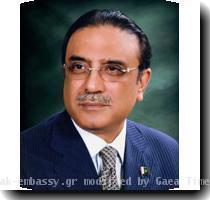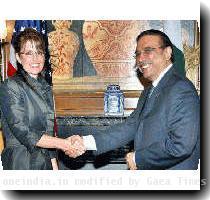Pakistani court deals US-backed president major blow by tossing out amnesty deal
By Zarar Khan, APWednesday, December 16, 2009
Pakistani court deals US-backed president big blow
ISLAMABAD — Pakistan’s top court struck down an amnesty Wednesday that had protected U.S.-allied President Asif Ali Zardari from corruption charges, setting the stage for political turmoil at a time when America seeks a united front against militants along the Afghan border.
The ruling is a major blow to the desperately unpopular Zardari and could mark the beginning of his downfall, analysts said. While he enjoys immunity from prosecution as president, Zardari’s opponents now plan to challenge his eligibility to hold the post.
A political crisis could complicate U.S. efforts to encourage Pakistan to step up military operations against al-Qaida-linked extremists. Effective action against those militant groups is seen by the U.S. as a linchpin of its war strategy.
A weakened Zardari would face a huge challenge in responding to U.S. pressure for a broad crackdown. Elements of the armed forces and much of the Pakistani public oppose a major offensive against Afghan militants who use Pakistan as a base. They instead blame Washington for stirring up turmoil in this country.
Minutes after the ruling, the opposition party called on Zardari to resign on moral grounds. His aides scoffed at the suggestion. Senior Cabinet minister Nabeel Gabol said Zardari had called a meeting of his ruling Pakistan People’s Party for Saturday to discuss the situation.
The court’s decision also left thousands of others who had been shielded by the amnesty vulnerable to reopened corruption and other criminal cases. Interior Minister Rehman Malik, the country’s top civilian security officer, and at least two other ministers loyal to Zardari are among those now at risk of prosecution.
The amnesty “seems to be against the national interest,” and “violates various provisions of the Constitution,” Chief Justice Iftikhar Mohammed Chaudhry said in announcing the decision of the 17-member bench.
The amnesty was part of a U.S.-brokered deal with former military ruler Pervez Musharraf that paved the way for former Prime Minister Benazir Bhutto to return home from self-exile and participate in politics without facing charges her party says were politically motivated. Zardari, Bhutto’s husband, took control of the party after Bhutto was assassinated in 2007.
The party won parliamentary elections in February 2008, and lawmakers elected Zardari president that September.
Despite his immunity from prosecution, Zardari’s opponents are now expected to challenge his qualification for the post, arguing that if it were not for the amnesty he would not have been able to run for president. Roedad Khan, a former government employee and a petitioner in the amnesty case, said he would pursue that avenue.
“This man has looted the wealth of this nation,” Khan said, comparing Zardari’s case to the Watergate scandal that led to the resignation of U.S. President Richard Nixon. “This is Islam-gate for Zardari,” Khan declared.
Analysts and legal experts were divided over whether the push for Zardari’s ouster will succeed. The process is likely to take months. Even some of Zardari’s critics argue that stopping his tenure at midterm — which would likely require a nod from the powerful army — would represent a setback to Pakistan’s transition to democratic rule after years of military government.
Zardari, 54, has long been haunted by corruption allegations dating back to governments led in the 1990s by his late wife. He spent several years in prison under previous administrations. There are allegations he misappropriated as much as $1.5 billion.
Zardari has routinely denied any wrongdoing, and the president’s office has declared the cases “unproven politically motivated allegations.”
The court on Wednesday singled out an alleged money laundering case involving Zardari and his late wife that had been heard in a Swiss court until the attorney general under Musharraf withdrew proceedings against them as a result of the amnesty. Chaudhry said this was illegal and ordered the government to ask Swiss authorities to reopen the case.
Many civil rights activists and ordinary Pakistanis have bristled over the amnesty, known as the National Reconciliation Ordinance, saying it protected the wealthy elite who govern the impoverished, corruption-plagued nation from being punished for their alleged crimes.
The court decreed that the reopened cases against all those covered by the amnesty would be monitored by special judges. The Supreme Court said it would also monitor the cases.
Pakistani political analyst Rasul Bakhsh Rais doubted that Cabinet ministers and other politicians affected by the ruling would simply step down. He noted that investigative and prosecuting entities in Pakistan are not really independent of the government — making real justice for lawmakers potentially elusive.
“They will play all these tricks and they will stay in power,” Rais said, predicting many messy court battles ahead.
Pakistan’s original constitution envisioned a parliamentary system in which the presidency is a ceremonial role, but the balance of power shifted under Musharraf, who took power in a 1999 military coup. Ever since Zardari took the presidency, the opposition has demanded he give up sweeping powers he inherited from Musharraf.
A few weeks ago, amid mounting pressure, Zardari relinquished command of the country’s nuclear arsenal and said he would give up more powers soon. But that’s a promise he’s made before, including in a major speech to lawmakers just days after being sworn in.
Earlier this year, Zardari gave in to street protests and reinstated Chaudhry as the chief justice after he was fired by Musharraf. Many analysts took Zardari’s reluctance to restore Chaudhry as a sign he worried the judge would try to undermine him by reviewing the amnesty.
Associated Press writers Munir Ahmad in Islamabad and Robert Burns in Washington contributed to this report.
Tags: As-pakistan, Asia, Asif Ali Zardari, Europe, Islamabad, North America, Pakistan, Parliamentary Elections, Political Corruption, Political Issues, Political Resignations, South Asia, Switzerland, United States, Western Europe

